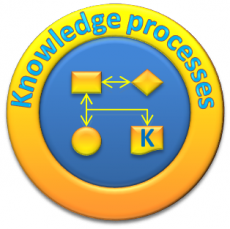Knowledge process
Contents
Definition
Knowledge process is Knowledge process is a process that acts on /or with knowledge, either individual knowledge or organizational knowledge.
Summary
A knowledge process is a process that acts on or with knowledge, either individual knowledge or organizational knowledge. Most business and organizational work processes are knowledge-dependent and/or knowledge-driven, and by definition they embed one or more knowledge process. In the NKM Wiki, nine main categories of knowledge processes are recognised, namely Creation, Validation, Transformation, Disposal, Learning, Combination, Finding, Maintenance, Sharing (See Fig. 1). Each knowledge process category is used to represent similar or inter-related knowledge processes. For a detailled list of knowledge processes, please refer to Knowledge process (disambiguation) article.
Purpose
- In the NKM Wiki, nine main categories of Knowledge processes are recognised (See Fig. 1 and click the pictures to see more about each category)
- Knowledge processes should support business processes
- Supportive culture is required to enable quality knowledge processes
- A KM strategy defines the implementation of knowledge processes
- Knowledge processes bring business benefits
- Challenges are solved using Knowledge processes
- KM Tools are enablers of knowledge processes
Sub-processes
The main categories of knowledge processes, mainly combination, creation, disposal, finding, learning, maintenance, sharing, transformation and validation, are depicted in Figure 1. To see the content of these categories, please refer to the category pages:
- Category:Combination processes
- Category:Creation processes
- Category:Disposal processes
- Category:Finding processes
- Category:Learning processes
- Category:Maintenance processes
- Category:Sharing processes
- Category:Transformation processes
- Category:Validation processes
Connection to other main categories
For connections between knowledge processes and KM benefits, challenges, organisations and tools, please refer to Portal:Knowledge processes and Navigator.
Contribution to the management system
Recommendation
Use the organisation’s yellow pages, intranet, community directories and social networks to find internal and external people with knowledge relevant to the specific knowledge area(s).
Table of business processes
knowledge processes are embedded in the following business processes in the Integrated management system. Each process has a score commensurate with its relevance to this process.
| Business process | Impact |
|---|---|
| Configuration management | High |
| Technical skill resources | High |
| Lessons learned | High |
| Information technology | High |
| Operating experience | High |
| Peer review | High |
| Technology development | High |
Processes not in the management system
KM tools
In the NKM Wiki, the KM tools have been categorised based on their relevance for each knowledge process. For link between knowledge processes and relevant tools, please refer to Category:Tools and the subcategories.
Case studies
Related articles
Sub-categories
Category:Combination processes
Category:Maintenance processes
Category:Transformation processes
Knowledge process (disambiguation)




